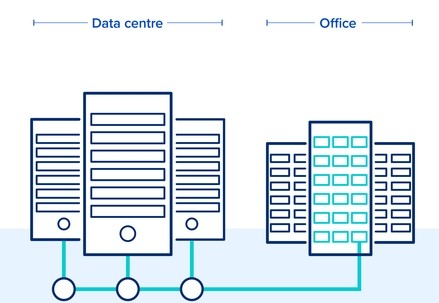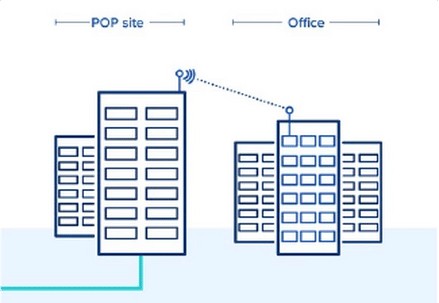Leased Lines
Dedicated internet access you can build your business on, with guaranteed speeds and 24/7 monitoring.

Image with text section
Hyperfast speeds with a full fibre connection
A leased line, also known as Dedicated Internet Access (DIA) is the perfect solution for a fast growing, bandwidth-hungry business. It’s our most popular business internet solution, giving you a fast, dedicated connection from your office, to the heart of the internet.
What’s the difference between business broadband and a leased line?
Unlike broadband, you don’t share your leased line connection with any other business or residential users. So your connection doesn’t slow down at peak times, and data transfer isn’t interrupted by other users. The speed you pay for is the speed you get.


Symmetrical upload and download speeds
With a leased line, upload and download speeds are the same. So your team can share large files, transfer data, upload to the cloud and your social media channels, all while people are video conferencing, running cloud-based applications and generally going about their business.
100% uptime guarantee available
Whether you choose a fibre or wireless leased line, your connectivity comes with a 99.99% uptime SLA. Alternatively, with our AlwaysOn backup connection, we provide a guaranteed connection 100% of the time. Engineers are working around the clock to keep you online, with proactive monitoring of your network and lightning-fast response times.
Managed and monitored 24/7
To keep your business up and running, our expert network engineering teams monitor your service day and night. AlwaysOn monitoring means, if anything happens to your connection, we are immediately aware of it and finding a solution within minutes.
Limitless potential and scaleability
We’re on a mission to support businesses and create a more connected Britain. Our build-once philosophy ensures you can scale-up your connection to 100Gbps instantly, which makes a Telcom leased line the last connection you’ll ever need.
Installed in days, not months
We built our own full fibre and point-to-point radio wireless network in key business cities across the UK. This means we can get you connected in as little as 20 days. With our engineering infrastructure and technical engineering teams, you’ll be online and doing business in days, not months.

Fibre or Wireless?
Fibre or Wireless?
Our flagship Direct Internet Access product. Using our own fibre infrastructure, we install unlimited, dedicated capacity direct to your site.

Ideal for places where fibre hasn’t been installed yet. Using one of our nearby fibre powered PoP sites, we relay fibre to your sight seamlessly using point-to-point radios.

Who uses a leased line?
Business critical applications
A leased line is used by businesses that rely on real-time, mission-critical applications. These applications need a stable and consistent internet connection to ensure uninterrupted operation.
Large-scale data transfer
Businesses that deal with large volumes of data require a high capacity connection to support efficient data transfer. A leased line provides robust and dedicated bandwidth, ensuring fast and reliable upload and download speeds at all times.


Cloud services including video conferencing
Businesses using cloud-based software and services rely on the consistent and predictable performance of a leased line.
With remote and hybrid working necessitating virtual meetings, reliable and low-latency internet connectivity is essential to support teams working all around the country.
Multi-site connectivity
Larger businesses spread across multiple locations use leased lines to ensure reliable, secure, high-speed connections between sites. It facilitates seamless collaboration and access to shared resources.
Frequently Asked Questions
-
What is a leased line?
The term, leased line refers to the lease or rental of an internet line. It’s also known as Dedicated Internet Access. A leased line gives you uncontended internet access, with symmetrical upload and download speeds, all for a monthly fee (hence the term, leased). Your bandwidth isn’t shared with anyone else, it’s a direct connection from your site to the heart of the internet.
To find out about the advantages of a Telcom Leased Line, contact our team of Connectivity Specialists today. -
What support will I receive from Telcom?
All Telcom customers start their journey with one of our Connectivity Specialists, who will take time to understand your business and work with you to find the best way to get your site connected. Once we’ve put together a proposal and the order form has been signed, our Service Delivery Team will organise getting you connected by our expert, in-house engineers.
Once your services are live, you’ll be assigned an Account Manager to support you throughout your time with Telcom. They’ll be your first point of contact for any concerns, queries or changes to your service. You’ll also have the support of our Technical and Network Support team and our Customer Experience Team who can help with any admin queries or if you need to raise a complaint.
You’ll also have an Online Account where you can contact any of the team, access support and find lots of general information about your account
To find out more, contact us today.
-
How does Telcom provide connectivity services?
We provide a whole range of internet connectivity services and solutions.
Full Fibre Our own fibre network, delivering hyperfast connectivity for business customers.
Wireless A great way to get dedicated bandwidth to you quickly. As long as we have line of sight to one of our fibre powered Point of Presence (PoP) sites, you could have a wireless connection within 2 hours. Perfect for temporary requirements, events, pre-ethernet connectivity or just to provide resilience.
Connected Building If you’re a tenant in one of our Preconnect® enabled buildings you can get connected to a resilient, Dedicated or Shared internet connection in as little as 24 hours.
Mobile We offer mobile internet solutions on any of the 4 major mobile network operators. You can also take our roaming solution, which will select the strongest mobile network operator signal at all times.
Partner fibre If you’re not in an area where you can get connected to a Pure Fibre Leased line, our team can still offer you a Telcom connection via one of our select fibre partners. It will still be on our network and you will still be our customer, so you know you’re in safe hands.
-
What type of connectivity does Telcom offer?
We have a wide range of connectivity options depending on your business needs. Contact our team about any of these products, services and solutions.
- Leased Line
- Dedicated Internet Access (DIA)
- Shared Internet Access (Broadband)
- Dark Fibre
- Metro Wavelength
- Long Haul Wavelength
- Ethernet P2P
- Ethernet VPN
- Cloud Connect
- IPVPN
-
When should you start to prepare for a leased line connection?
Preparing for any new internet connection requires considerable thought and planning. We recommend beginning the conversation with Telcom at least four months in advance of the required “go live” date. This allows time to find the perfect solution for your business, and then get your site surveyed, mapped out and connected without having to rush or panic.
It also allows for industry-related events like blocked ducts or working with third parties, without causing a delay to your deadline. We can often connect your company in as little as 20 days but we don’t recommend only leaving yourself this much time. It’s not just about what we can do, it’s how we want your experience to be.
Talk to our Connectivity Specialists today about your internet service and find the right solution for your business.
-
Why are domestic internet prices and business internet prices different for similar speeds?
There are several key differences between Business Class Internet (BCI) and Domestic Standard Internet (DSI) that explain the price difference.
With Business Class Internet you have an uncontended line. Leased lines are uncontended which means no one else sharing your internet and it won’t slow down at peak times. The contended service that the average household gets could be shared with the whole street. So when everyone else switches on Netflix, you might have a pixelated start to your favourite show.
One key difference in most Business Class Internet services is how far the fibre goes. We take the fibre actually into the building, and connect it directly to the cabinet in our customer’s office or building. Most Domestic Class Internet is connected to fibre somewhere nearby, but it’s copper that is coming into their homes and connecting to their router.
A huge difference for Business Class Internet is the Service Level Agreement (SLA). Due to the reliability of the fibre, there are less likely to be any issues. But if there are, we’ll have an engineer sorting it out right away. We understand the importance of dealing with any faults or interruptions fast, often before the business even knows there’s a problem. We also compensate the business for the loss of connection. Domestic Class Internet doesn’t have the same level of reliability or direct support such as access to a network specialist. It’s also unlikely a domestic customer will receive any credit for loss of service.
These key differences make the cost of Business Class Internet higher than a Domestic Class Internet connection, despite the speeds being advertised as the same. To find out more about our Business Class Internet, talk to a Telcom Connectivity Specialist today.
-
What kind of internet speeds will I need?
It is really important to get the right internet speed for your office. At Telcom we take the time to understand your needs and discuss the most suitable speeds. After all, you don’t want to be paying for bandwidth you’ll never use.
We consider what you use the internet for, the size of your business, any fluctuations in office use and potential growth for the future. There’s no one size fits all and we will ensure we are getting the most suitable speed for your business.
The great thing about a Telcom leased line is, we can always increase your internet speed as your business grows. To help you find the right internet speed for your business, contact our team of Connectivity Specialists today.
-
How do I know if I need internet security?
Most businesses need network security to protect their data. It’s particularly important with financial data, to make sure you adhere to regulatory requirements and legislation. Fraudsters are constantly coming up with new, inventive ways to access your business data, including viruses, malware and vishing. So talk to one of our Connectivity Specialists today and discover how we can protect your business and your data.
There different levels of security products depending on the needs of your business. Let us help you identify what’s right for your business and your budget.
-
Why would I need a back-up internet connection?
A Telcom uncontended leased line is an ultra-reliable business internet service, but sometimes something completely unexpected occurs. A roadwork person drilling into our ducts by mistake doesn’t happen often but these uncontrollable events can take your business offline. If your business can’t risk this, it might worth considering a backup line (also known as failover).
You use your internet services to support customers, take payments, transfer data, run reports, access cloud-based apps… the list in endless. At Telcom we recommend diversity of source in your backup solution. So if your main internet line is fibre, your backup might be wireless. To find out more, contact our Connectivity Specialists today.
-
Why might I need two different types of internet connection?
It’s really important to take a moment to consider how much damage an internet outage would cause your business. An hour might be manageable, but what if it turned into a whole day or even a few days?
The unexpected does happen and even with round-the-clock engineering support, some outages aren’t simple or quick to fix. So at Telcom we recommend you have diversity when it comes to your backup connection. With diversity, if your fibre connection is severed, for example, you still have the wireless point to point connection to fall back on. So while we work on fixing the break, you can keep doing business.
To discuss diverse connectivity options, talk to our team of Connectivity Specialists today.
-
What is the difference between a leased line and a shared line?
A shared line means there will be a number of other customers using the same connection, but you will receive a guaranteed minimum bandwidth. Our standard shared connections are normally between 5 or 10 users, though this varies depending on how many people in a building are using a service.
Shared connections (sometimes known as business broadband) are usually less costly than a dedicated leased line that’s solely for your business. Smaller, less data-hungry businesses might be able to get away with a shared line but a leased line (also known as Dedicated Internet Access) gives you guaranteed speed because no other business shares your bandwidth. A leased line can be fibre or wireless and it’s usually used by larger or more data-hungry businesses.
To find out if you need a leased line or a shared connection or a DIA, contact our Connectivity Specialists today.
-
Do Telcom have their own network?
Yes - we built and own our own network, which is 100% independent of BT Openreach or Virgin Media Business. As a full-stack company, we partner with local authorities, real estate owners, investors, landowners and communities to design and deploy metropolitan networks, whilst partnering with service providers who are able to offer products and services directly to our end consumer. We are super proud of our infrastructure division, ‘Telcom Infrastructure’, who work tirelessly day in day out to extend our fibre network, in order to connect our full fibre network to businesses everywhere.
-
What's the difference between Megabit (Mbit) and Megabyte (MByte)?
In order to explain this, we need to start with the difference between a bit and a byte.
A bit (short for binary digit) is the smallest unit of digital information, either a 1 or a 0. A byte is a group of eight bits.
Scaling this up, 1 Megabit (often written MBit or Mb) is 1,000,000 bits, and 1 MegaByte (MByte or MB) is 1,000,000 bytes. As there are 8 bits in every byte, there are 8 Megabits in every MegaByte.
In short, 1 Megabit is 1 million 1s and 0s, while 1 MegaByte is 8 million 1s and 0s.
Confusingly both terms are commonly used in computing. MegaBits are used for measuring an internet connection download or upload speed. Megabytes are used to measure file size.
In terms of download and upload speeds, when someone says a connection is 30 Megabits per second, this needs to be divided by eight to find the MegaBytes per second that will be transferred.
The most common way people are confused is when speeds are written in short forms, like 30Mbps or 30MBps, without additional clarification as to whether the ‘b’ is a bit or a byte. The common convention for the shortened form is, a lowercase ‘b’ represents bits and an uppercase ‘B’ represents bytes.
-
What is a Gigabit?
One gigabit per second (Gbps) is a 1,000 megabits per second (Mbps) connection. A gigabit is 100 times faster than basic broadband speeds, which means no waiting and no buffering. You can get what you want virtually instantaneously, whether you’re video conferencing, uploading videos to social channels, accessing cloud-based software or generally getting on with business.

